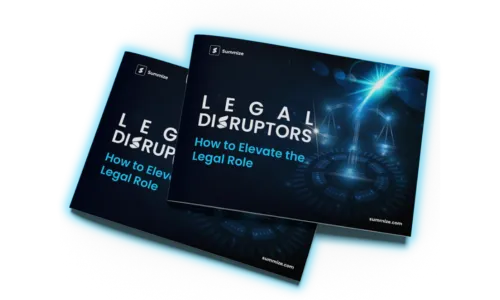Venturi's Voice: From Team GB to Legal
In this episode, Venturi's Voice discusses Tom Dunlop's career history as a professional GB athlete and his thoughts on the increase of tech adoption in legal.
November 1, 2021
December 19, 2025
In this episode of Venturi’s Voice podcast, host Ben Malloy is joined by Summize’s CEO and Co-founder Tom Dunlop, for a wide-ranging conversation that explores Tom’s unconventional career path, the crossover between elite sport and entrepreneurship, and the realities of building a legal technology company in a traditionally slow-moving industry.
Ben, a regular voice on the podcast, guides the discussion with curiosity and energy, drawing out Tom’s experiences both inside and outside the legal world. Tom brings a unique perspective as a former elite badminton player turned lawyer, in-house legal leader, and now tech founder. Together, they unpack not only how Summize came to be, but also the broader challenges facing legal teams today and how technology can support meaningful change.
From elite athlete to legal tech founder
Tom’s journey into the legal industry was far from conventional. His early ambition was not law or entrepreneurship, but representing Great Britain as a professional badminton player and potentially competing in the Olympics. Alongside training and international competition, he completed a law degree, eventually reaching a point where he had to choose between sport and a full-time professional career.
That decision led him into law, initially through necessity rather than passion, after struggling to secure a training contract due to a perceived lack of commercial experience. Over time, however, Tom carved out a legal career that took him in-house at fast-growing tech companies, where he worked closely with founders and leadership teams. Those experiences ultimately planted the seeds for Summize, born out of frustration with manual, repetitive contract review and a belief that there had to be a better way.
How sporting discipline translates to entrepreneurship
A major thread in the discussion is the link between elite sport and successful founders. Tom explains that the traits developed through high-level athletics, such as discipline, resilience, continuous improvement, and mental strength, are strikingly similar to those required to build a business from scratch.
At Summize, this mindset shows up in our company’s culture, particularly the idea of constant marginal gains. Rather than chasing radical overnight transformation, Tom emphasizes finding the extra one percent: small improvements made consistently over time. This philosophy, shaped by years of competitive sport, now informs how we build our product, hire talent, and approach growth.
Why legal has been slow to adopt technology
Ben and Tom also explore why legal has lagged behind other industries, such as banking or finance, when it comes to technology adoption. Tom argues that the core issue lies in the advisory nature of legal work. Unlike process-driven or numerical tasks that are easier to automate, legal advice depends heavily on judgement, context, and expertise.
On top of that, the traditional hourly billing model creates resistance to change. Time spent learning new systems can feel like lost revenue, making innovation harder to justify in the short term. Tom suggests that many legal tech solutions have struggled because they promise replacement rather than enhancement, failing to recognize that technology should support lawyers, not remove them from the equation.
Changing mindsets through gradual, practical innovation
When it comes to driving change, Tom is clear that mindset shifts do not happen overnight. Summize’s approach focuses on incremental improvement and meeting lawyers where they already work. Instead of forcing teams into unfamiliar systems, the product integrates with tools like Microsoft Word, making adoption feel natural rather than disruptive.
Tom explains that this step-by-step approach reduces fear and resistance, allowing legal teams to gradually move from manual processes toward more intelligent, data-led ways of working. Client pressure and broader market expectations are also playing a role, as legal increasingly feels the need to catch up with the rest of the modern business stack.
This episode offers a thoughtful look at leadership, culture, and innovation from someone who has lived across sport, law, and technology. To hear Tom’s story in his own words, and to dive deeper into the challenges and opportunities shaping legal tech today, be sure to listen to the full episode of Venturi’s Voice at the top of the article, and to explore more of our insights, take a look at our articles below.
Discover even more!
Explore more about contracting and CLM in our ultimate contract guides








